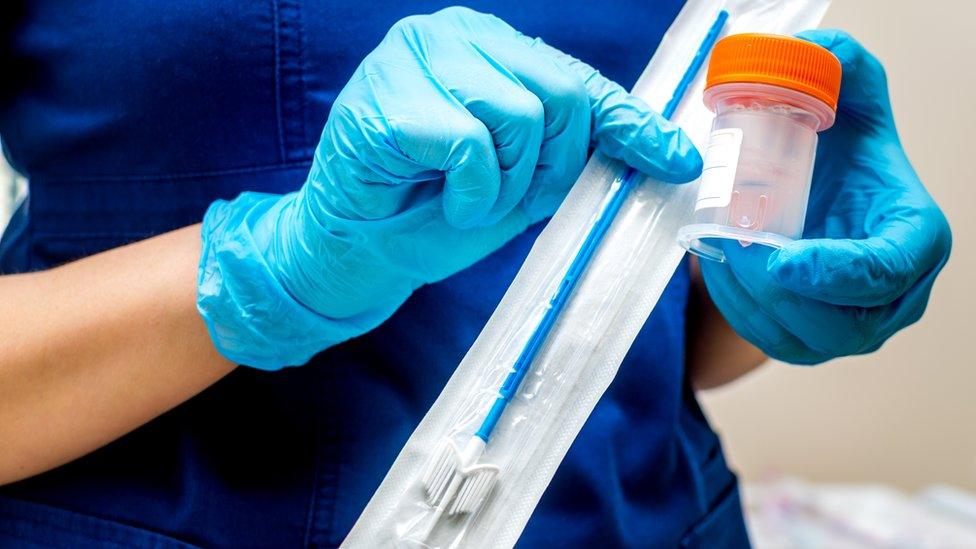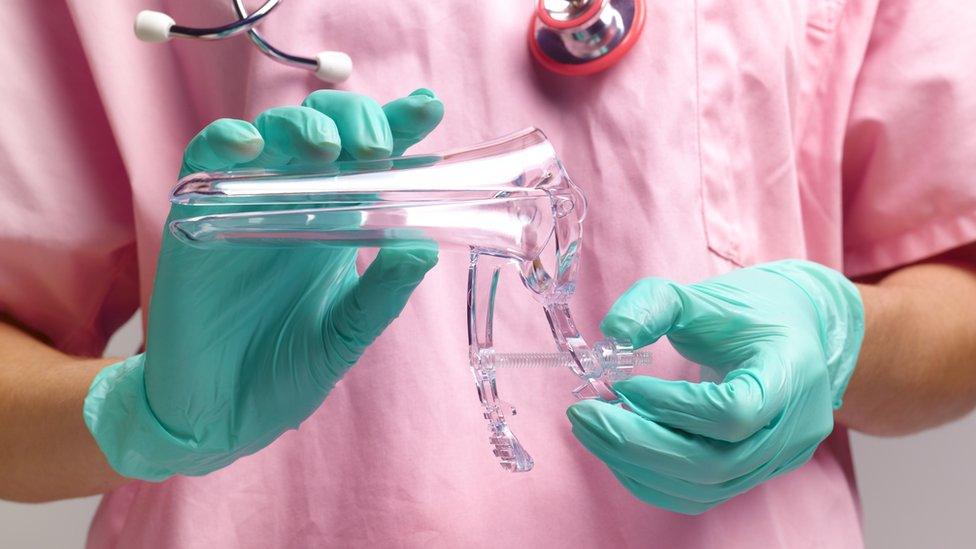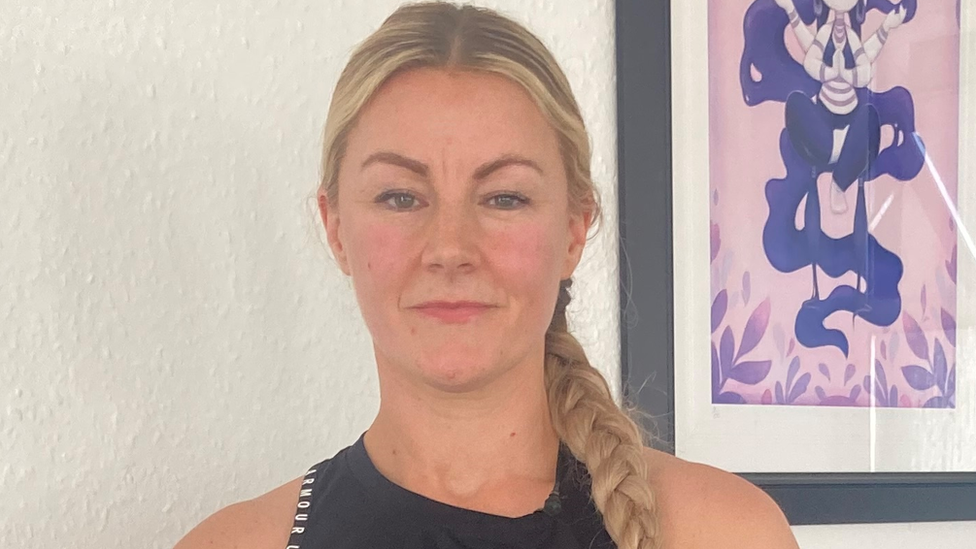Cervical cancer: 'I have a right to know about my smear test review'
- Published
Victoria Poole says women's health is often "put to the bottom of the list" in Northern Ireland
A County Down woman has said not knowing where her case is in the ongoing review into cervical smears at the Southern Health Trust is adding to her distress.
Victoria Poole, 33, is one of 17,000 women who are affected by the review.
Thousands of women in NI are being recalled to attend for a repeat smear.
The Southern Trust has said it is working through cases as quickly as possible.
It is thought that thousands of slides will have to be re-checked.
To date, approximately 1,000 slides have been reviewed, with 800 of those women notified about their result.
Speaking to BBC News NI, Ms Poole said there had been no direct communication from the trust since a letter in October told her she was involved in the review.
The Southern Trust said it is in direct contact with women and provides numerous channels for communication, including a dedicated liaison support service and a free phone information line.
According to the trust, it prioritised cases thought to be most at risk.
The trust's medical director, Dr Stephen Austin, said while it was "still early days", so far a small number had revealed low grade abnormalities which is expected and not a concern.
He added there had been "no high-grade abnormalities" which were cases that could progress to cancer if left unchecked or untreated.

Why do the tests need reviewed?
In July 2022, laboratory staff notified Southern Trust management that they had concerns about the performance of some screening staff.
The Royal College of Pathologists (RCPATH) were asked to carry out an independent assessment of the Trust's cervical screening service over 10 years.
What happens during a smear test?
It found that while most negative results were correct, a significant number of women were likely to have had negative screening results which would have been identified as potentially abnormal by other laboratories.
As a precautionary measure in October 2023 the Southern Trust announced a review of more than 17,000 women to double check that their previous smear result was correct.
Both the slide review and the repeat smear clinics are running simultaneously.

Tracey Bell, 44, has been invited to attend for a further smear test.
However, her request to have her smear history reviewed at the same time has been rejected.
'I have a right to know'
Speaking about Mrs Bell's case, Dr Austin said women at this stage could not be part of the historic slide review as well as the smear test recall because at this stage they were trying to provide an outcome for every woman as soon as possible and a dual outcome would only slow the system down.
Dr Austin said those women who had been invited to attend for a new smear should do so as it would provide them with their most up to date cervical diagnosis.
He said he was not ruling out that in the future those women could access their smear slides but insisted at the moment it was either one or the other.

Tracey Bell says she has "lost all faith in the system"
Mrs Bell, who also requested her cervical medical notes, said it was unsatisfactory that most of the information was redacted.
According to Dr Austin some information was redacted to protect the identity of the screeners who were involved in the review.
Mrs Bell said she was experiencing some symptoms which suggests there could be abnormalities and that's causing her concern.
She added that under those circumstances she wants her old slides reviewed as well as being given a new smear.
"I feel I have a right to know and to be given a full picture for peace of mind," she said.
Five members of her family have also received letters she said her biggest fear is that one of them is going to receive very bad news about their health.
"I have lost all faith in the system and feel let down. I feel the system wasn't working properly for 13 years and let all us women down."
Primary HPV screening
In December, Northern Ireland introduced primary HPV screening which tests the cervical cells for the HPV virus first.
It brought NI in line with the rest of the UK.
High risk HPV can cause cervical cells to become abnormal and potentially develop into cancer over time. .
Virtually all cases of cervical cancer are linked to high-risk HPV.
This newer HPV test is regarded as more accurate at detecting who is a higher risk of developing cervical cancer.
According to the Public Health Agency, the new process means women will get their results much quicker which will also help tackle the backlog of cervical smear tests.
Dr Tracy Owen, deputy Director at the PHA said the new system, which is a much better test also meant they are getting results out more quickly within a couple of weeks.
As well as the slide review repeat smear clinics are also running.
They began in November 2023 and the Southern Trust is continuing to contact women to offer appointment for repeat tests.
However according to the Trust uptake is "disappointing" as just 475 women have attended out of a potential 1,586 invited.
2016-2020
81 cases annually(On average)
21 deaths annually(On average)

The trust said while many smears were offered and booked, a very large number of women "unfortunately" did not attend their appointment.
Dr Austin said the trust still anticipated that a very small number of women would be adversely affected by what had happened.
Ms Poole said that was no consolation to the one or two women who may receive bad news.
Dr Austin said it was hoped the review would be completed and women informed by the end of June.
Western Health Trust review
BBC News NI can also reveal that the Western Health Trust is now carrying out an "external review of cytology slides" that have been reported as serious adverse incidents (SAIs).
In October BBC News NI reported there had been 12 SAIs registered within the Western Health Trust since 2017 in relation to cervical screening.
In a letter from the Department of Health, and seen by the BBC, the permanent secretary at the Department of Health Peter May has written to the Social Democratic and Labour Party assembly member Mark H Durkan, who raised concerns about a number of cases, to say that an external review was being conducted by the cervical cytology service in Wales.
A spokesperson for the Western Health and Social Care Trust said that although the trust has had a higher number of cytology SAIs than other trusts, "a recent unannounced inspection by UKAS [the United Kingdom Accreditation Schemes] stated the review of serious incidents reported showed due diligence by the laboratory in both reporting and recording keeping".
"The laboratory are reporting SAIs at a higher threshold than the approved guidance, stating that 'this should be commended'," the spokesperson added.
"As part of quality assurance checks, the Western Trust asked colleagues at a screening laboratory in Wales to carry out a peer review on the 12 SAIs reported. The purpose of this is to inform whether these are 'true' SAIs or if there has been some over-categorisation. This does not represent part of any wider review."
The Department of Health said anyone who is concerned about potential signs of cervical cancer should contact their GP.
Signs and symptoms of cervical cancer can include:
vaginal bleeding after sex, between periods or after the menopause
vaginal discharge that is not normal for them
persistent back or tummy pains
pain during sex
Related topics
- Published11 December 2023

- Published9 October 2023

- Published11 December 2023

- Published13 September 2023
